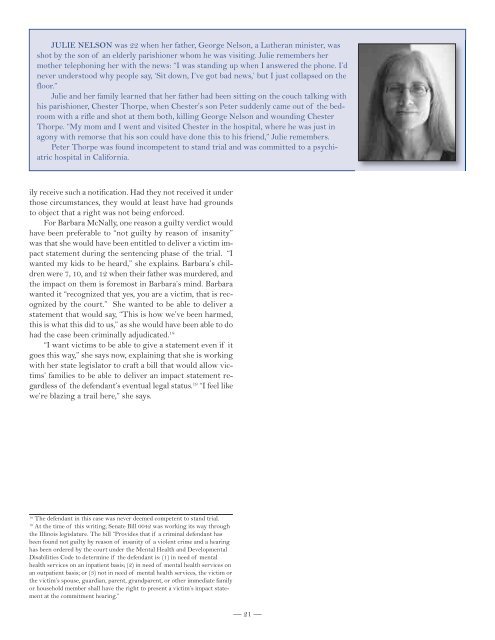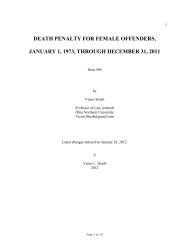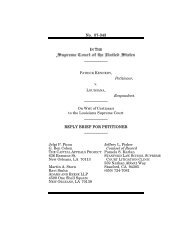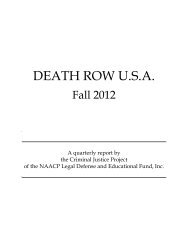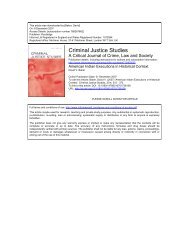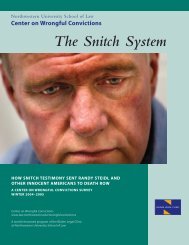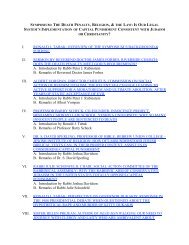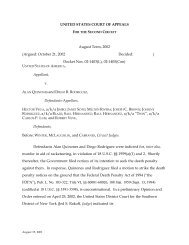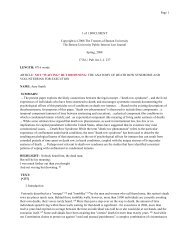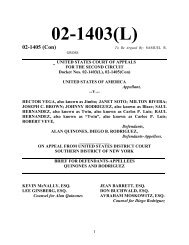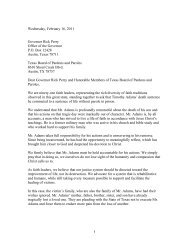JULIE NELSON was 22 when her father, George Nelson, a Lutheran minister, wasshot by the son of an elderly parishioner whom he was visiting. Julie remembers hermother telephoning her with the news: “I was standing up when I answered the phone. I’dnever understood why people say, ‘Sit down, I’ve got bad news,’ but I just collapsed on thefloor.”Julie and her family learned that her father had been sitting on the couch talking withhis parishioner, Chester Thorpe, when Chester’s son Peter suddenly came out of the bedroomwith a rifle and shot at them both, killing George Nelson and wounding ChesterThorpe. “My mom and I went and visited Chester in the hospital, where he was just inagony with remorse that his son could have done this to his friend,” Julie remembers.Peter Thorpe was found incompetent to stand trial and was committed to a psychiatrichospital in Cali<strong>for</strong>nia.ily receive such a notification. Had they not received it underthose circumstances, they would at least have had groundsto object that a right was not being en<strong>for</strong>ced.For Barbara McNally, one reason a guilty verdict wouldhave been preferable to “not guilty by reason of insanity”was that she would have been entitled to deliver a victim impactstatement during the sentencing phase of the trial. “Iwanted my kids to be heard,” she explains. Barbara’s childrenwere 7, 10, and 12 when their father was murdered, andthe impact on them is <strong>for</strong>emost in Barbara’s mind. Barbarawanted it “recognized that yes, you are a victim, that is recognizedby the court.” She wanted to be able to deliver astatement that would say, “This is how we’ve been harmed,this is what this did to us,” as she would have been able to dohad the case been criminally adjudicated. 18“I want victims to be able to give a statement even if itgoes this way,” she says now, explaining that she is workingwith her state legislator to craft a bill that would allow victims’families to be able to deliver an impact statement regardlessof the defendant’s eventual legal status. 19 “I feel likewe’re blazing a trail here,” she says.18The defendant in this case was never deemed competent to stand trial.19At the time of this writing, Senate Bill 0042 was working its way throughthe Illinois legislature. The bill “Provides that if a criminal defendant hasbeen found not guilty by reason of insanity of a violent crime and a hearinghas been ordered by the court under the Mental Health and DevelopmentalDisabilities Code to determine if the defendant is: (1) in need of mentalhealth services on an inpatient basis; (2) in need of mental health services onan outpatient basis; or (3) not in need of mental health services, the victim orthe victim’s spouse, guardian, parent, grandparent, or other immediate familyor household member shall have the right to present a victim’s impact statementat the commitment hearing.”__ 21 __
Turning Grief into ActionAmanda and Nick Wilcox actively sought an admissionof guilt and acknowledgment of harm done, but they pursuedthis primarily within the mental health, rather thancriminal justice, arena. After their daughter Laura’s murder,the Wilcoxes filed a wrongful death suit against thecounty, on the basis that the murders (of Laura, and of ScottThorpe’s other victims) were “predictable and preventable”and that “the county had failed in both those things,” as Nickexplains now. Nick continues, “We wanted the county to deliveran acknowledgment of harm and an apology to us, andwe wanted to deliver a victim impact statement.”In their eventual settlement, 20 the Wilcoxes did receivea public apology, read at the county Board of Supervisorsmeeting, and they delivered their own impact statements atthat same meeting. Amanda’s statement began by describinghow she had learned of Laura’s murder:I remember becoming numb, feeling as if I were underwaterwith my senses diminished. My kneesbuckled, I sat down. Our two tall teenage sonscrawled into my lap, and <strong>for</strong> my family, life as weknew it was over. … I spent the next months in astate of shock, disbelief, pain and physical illness. Icould not sleep. I slowly adjusted to my new life asa grieving mother. Now the hurt is not as raw, but itruns deep. The grief and heartache come in unexpected,overwhelming waves.As parents of a murdered child, we had, and stillhave, three great needs: in<strong>for</strong>mation, accountability,and most importantly, recognition of the harm wehave endured. We have had difficulty with all three. 2120The settlement also included (1) Nevada County’s commitment to implementingLaura’s Law if Prop 63, the “Mental Health Services Act,” passed atthe state level, (2) a meeting between the Wilcoxes and Scott Thorpe’s psychiatrist,in a restorative justice setting, (3) naming the new county facility <strong>for</strong>children’s mental health and other children’s services the “Laura Wilcox Building,”(4) a cash payment of $150,000, and (5) the County’s agreeing to be responsible<strong>for</strong> paying the full cost of the Wilcoxes’ grief counseling. TheWilcoxes donated the cash settlement (which, after discovery costs and attorneyfees, came to about $55,000) to the Prop 63 campaign, to child advocacy andmental health advocacy organizations, and <strong>for</strong> scholarships. Amanda says, “Wenever planned to, and will not, keep any of the settlement money.”This is at the heart of the phrase “victim impact statement”:an opportunity to describe, and be heard describing,the devastation that murder causes. But the Wilcoxes’ pursuitwas also of an acknowledgment that Scott Thorpe’smental health treatment prior to the murders had been inadequateand – critical to their argument – truly could havebeen better. Just as Joe Bruce, quoted earlier, learned laterthat medical records included a psychiatrist’s note sayingthat his son William Bruce presented a high risk <strong>for</strong> violenceif released from the hospital, so did the Wilcoxes learn thata psychiatrist’s evaluation had characterized Scott Thorpeas “potentially dangerous and on the verge of needing hospitalization.”22The Wilcoxes had actually wanted a finding of “notguilty by reason of insanity,” because they viewed that findingas a way of pursuing accountability from another angle.“We actually had the same view as the public defender,” Nickrecalls. “We both wanted to show the lack of mental healthcare. He wanted “not guilty by reason of insanity” <strong>for</strong> hisclient and we wanted that too because we wanted to getknowledge and change.”The Wilcoxes soon advocated <strong>for</strong> the legislation that becameknown as “Laura’s Law,” which allows <strong>for</strong> court-orderedoutpatient treatment <strong>for</strong> people with mental illnesswho pose a risk <strong>for</strong> violence and have refused voluntary treatment.23 It was modeled on similar legislation in New York,“Kendra’s Law,” named <strong>for</strong> Pat Webdale’s daughter Kendra.<strong>Families</strong> who advocate <strong>for</strong> this kind of policy change donot necessarily view it as an airtight solution to the problemof violence committed by persons with mental illness; in aninterview with his local newspaper, Nick Wilcox said of thelegislation, “We recognize it was less than a perfect bill, but21Amanda Wilcox testimony be<strong>for</strong>e the Nevada County Board of Supervisors,September 28, 2004.22Nick Wilcox testimony be<strong>for</strong>e the Nevada County Board of Supervisors,September 28, 2004.23The legislation, which originally passed in 2002, did not include a fundingstipulation, and the decision about whether to implement the bill’s “assistedoutpatient treatment” program was left to each county. When Cali<strong>for</strong>nia’sProposition 63, the Mental Health Services Act, passed in 2004, the Wilcoxeswere among those who hoped that now counties would have the funds theyneeded to implement Laura’s Law more widely.__ 22 __


